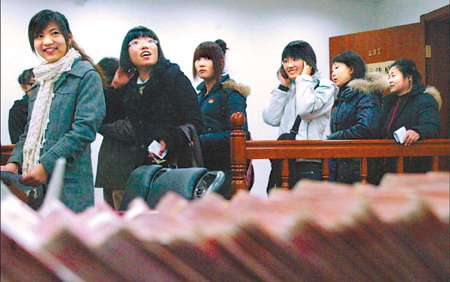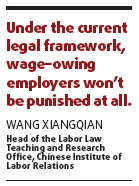Society
Migrants to fight for missing wages
By Zhang Yan (China Daily)
Updated: 2009-12-10 08:16
 Workers from Desheng Jiangshan Hotel and Jiangshan Yiyuan Hotel win their share of almost 300,000 yuan in unpaid wages at Xicheng court on Wednesday. [Cheng Ning] |
Thirty-five migrant workers who threatened to jump from a 10-story building because of a wage dispute will sue the construction company in Changping district court.
A court press officer surnamed Xia said the local government advised the workers to fight for their outstanding wages and the case would be heard at a later date.
The 35 workers are among a group of 56 men owed a total of 518,000 yuan from the Heibei Xingkai Construction Engineering Company.
On Tuesday, the frustrated workers threatened to jump from an apartment building in Tiantongzhongyuan community, Changping district.
Xia said that between early 2007 and late 2008, the workers performed tasks including interior decoration, bricklaying and carpentry for the company.
An executive surnamed Zhao from Heibei Xingkai Construction Engineering Company said the company did owe money to the migrant workers.
Zhao said the company would check on the progress of the payments and then discuss settlement options with the workers.

Wang Xiangqian, head of the Labor Law Teaching and Research Office, Chinese Institute of Labor Relations, said: "Under the current legal framework, wage-owing employers won't be punished at all, even though they can get a lot of benefit from delaying payment to workers."
Adding to the problem is that many migrant workers do not sign labor contracts with employers, which makes it difficult to collect evidence, Wang said.
According to Chinese law, if employers don't pay employees in the amount of time outlined in the signed labor contract or national law, the labor administrative department can order them to pay it.
If an employer continues to miss wage payments, they can be ordered to pay the outstanding wages and an additional 50 percent of the amount in compensation.
Tong Lihua, head of the City Migrant Workers' Law Assistance and Research Center, said "malicious wage-owing behavior" by employers should be made a crime.












